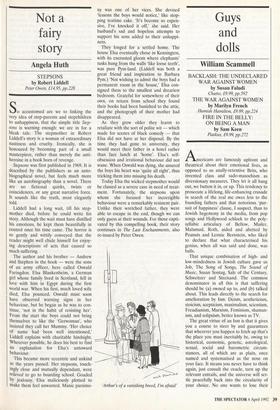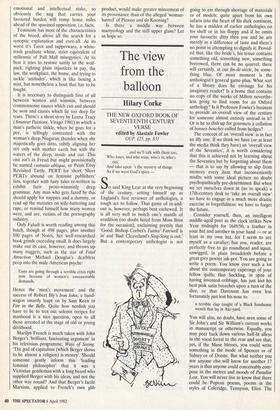Guys and dolls
William Scammell
Anericans are famously upfront and theatrical about their emotional lives, as opposed to us anally-retentive Brits, who invented class and sado-masochism as diversionary measures. They let it all hang out, we button it in, or up. This tendency to prosecute a lifelong, life-enhancing crusade in search of the real me owes less to the founding fathers and that notorious 'pur- suit of happiness' clause, I suspect, than to Jewish hegemony in the media, from pop songs and Hollywood schlock to the poly- syllabic articulacy of Bellow, Mailer, Malamud, Roth, aided and abetted by Peanuts and Lennie Bernstein, who liked to declare that what characterised his genius, when all was said and done, was balls.
That unique combination of high- and low-mindedness in Jewish culture gave us Job, The Song of Songs, The Sound of Music, Susan Sontag, Sale of the Century, Schweitzer and Streisand. The common denominator in all this is that suffering should be (a) owned up to, and (b) talked about. This leads directly to the search for amelioration by Ism: Deism, aestheticism, stoicism, scepticism, maximalism, scientism, Freudianism, Marxism, Feminism, shaman- ism, and solipsism, better known as TV.
The great virtue of an Ism is that it gives you a course to steer by and guarantees that wherever you happen to fetch up that's the place you must inevitably be, owing to historical, economic, genetic, astrological, sexual, social and barometric circum- stances, all of which are as plain, once named and systematised as the nose on your face. It means you never have to think again, just consult the oracle, turn up the relevant entrails, and the universe will set- tle peacefully back into the circularity of your choice. No one wants to lose their emotional and intellectual stake, so obviously the nag that carries your favoured burden will romp home miles ahead of the spavined opposition, i.e. facts.
Feminism has most of the characteristics of the breed, above all the search for a synoptic explanation and cure-all. At its worst it's Tarot and tupperware, a white- trash graduate whine, strict equivalent of millennia of Pall Mall misogynies. At its best it tries to restore sanity to the wolf- pack, righting plain injustices in pay, the law, the workplace, the home, and trying to tackle 'attitudes', which is like boxing a mist, but nonetheless a bout that has to be fought.
It is necessary to distinguish first of all between women and wimmin, between commonsense causes which can and should be won and causes which lie too deep for tears. There's a short story by Lorna Tracy (Amateur Passions, Virago 1981) in which a man's pathetic tinkle, when he goes for a pee, is tellingly contrasted with the woman's deep Niagaran thunder when she majestically goes ditto, subtly aligning her not only with mother earth but with the waters of the deep, inside and out. This one isn't in Freud but might provisionally be named castratio obliqua, or Penis Envy Revisited Tartly, PERT for short. Short PERTs abound on feminist publishers' lists, together with fairy tales re-written to exhibit their proto-wimminly deep grammar. Any man who gets fazed by this should apply for nappies and a dummy, or read up the statistics on wife-battering and rape, or remind himself how many women were, and are, victims of the pornography industry.
Only Faludi is worth reading among this batch, though at 498 pages, plus another 100 pages of Notes, her well-researched book grinds exceeding small. It does largely make out its case, however, and throws up many nuggets, such as the star of Fatal Attraction Michael Douglas's deathless peep into the male American psyche:
Guys are going through a terrible crisis right now because of women's unreasonable demands.
Hence the `men's movement' and the success of Robert Bly's Iron John, a band- wagon smartly leapt on by Sam Keen in Fire in the Belly. Quite how nerdish you have to be to trot out solemn recipes for manhood is a nice question, open to all those arrested at the stage of old or young devilhood.
Marilyn French is much taken with John Berger's 'brilliant, fascinating argument' in his television programme, Ways of Seeing.
`The god of capitalism (which Berger shows to be almost a religion) is money'. Should someone gently inform this 'leading feminist philosopher' that it was a Victorian gentleman with a long beard who supplied Berger with his ideas, and not the other way round? And that Berger's facile Marxism, applied to French's own glib product, would make greater mincemeat of its provenance than of the alleged 'woman- hatred' of Picasso and de Kooning?
Is there a middle way between martyrology and the stiff upper glans? Let us hope so.



























































 Previous page
Previous page